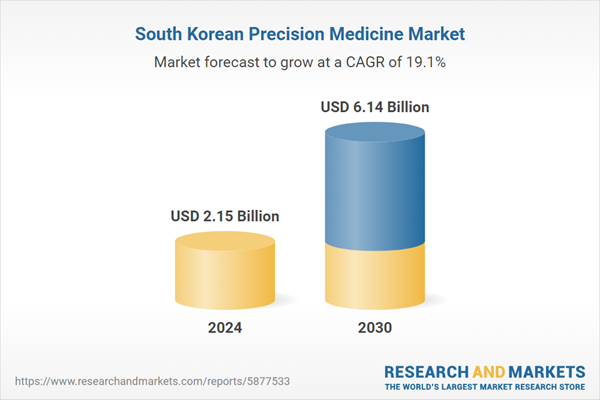Speak directly to the analyst to clarify any post sales queries you may have.
10% Free customizationThis report comes with 10% free customization, enabling you to add data that meets your specific business needs.
South Korea has seen substantial growth in the rapidly evolving field of precision medicine. Based on a patient's biological makeup, lifestyle, and environmental circumstances, precision medicine seeks to customise medical treatments for each individual patient.
Precision medicine has experienced an unprecedented shift in South Korea due to developments in genomes and omics technologies. A huge quantity of genomic data can now be more easily analysed by researchers and healthcare professionals. This has created a way for treatments that are specifically tailored to a patient's genetic profile. The development of precision medicine in the country is being fueled by the integration of genomes with additional omics data, such as proteomics and metabolomics, which has improved the understanding of disease and treatment response.
In addition, cancer biology is evolving because of increased investment in research and development for high-quality precision therapy. Around 15 clinical studies involving precision medicine were being carried out in South Korea as of February 3rd, 2023.
Key Market Drivers
Robust Government Support and Strategic Investment in R&D
The South Korean government has been instrumental in propelling the precision medicine sector through substantial investments and supportive policies. Initiatives like the “Digital New Deal” have emphasized the integration of advanced technologies into healthcare, fostering an environment conducive to precision medicine. This includes the expansion of telemedicine, electronic health records (EHR), and AI-driven healthcare platforms.Furthermore, the Ministry of Science and ICT's Bio-Venture Support Program provides financial assistance to early-stage life sciences startups, aiming to nurture innovative ideas and technologies in the field. Such programs have been pivotal in accelerating research and development activities, particularly in genomics, data analytics, and diagnostic technologies. Leading institutions like Seoul National University Hospital and Asan Medical Center have made significant contributions, with the latter collaborating closely with international partners to enhance precision cancer care.
These concerted efforts have positioned South Korea as a burgeoning hub for precision medicine, with the government's commitment to fostering innovation playing a central role in the sector's growth.
Key Market Challenges
High Costs and Limited Accessibility of Precision Medicine
Despite the advancements in precision medicine, high costs remain a significant barrier to its widespread adoption in South Korea. The development and implementation of precision medicine require substantial investment in companion diagnostics, genetic testing, and specialized equipment, making treatments expensive.Healthcare professionals have expressed concerns that the high costs may limit access to precision medicine, particularly for patients without comprehensive insurance coverage. This financial barrier could exacerbate health disparities, as only a subset of the population may afford these advanced treatments.
Addressing this challenge requires policy interventions to subsidize costs, expand insurance coverage for precision medicine services, and invest in cost-effective technologies to make personalized healthcare more accessible to the broader population.
Key Market Trends
Expansion of Telemedicine and Remote Patient Monitoring
The COVID-19 pandemic accelerated the adoption of telemedicine and remote patient monitoring in South Korea, trends that continue to influence the precision medicine landscape. These technologies enable healthcare professionals to remotely monitor patients, gather health information, and deliver individualized interventions without the need for in-person visits.The integration of wearable technology and sensors allows for continuous monitoring of vital signs, disease progression, and treatment effectiveness. This real-time data collection is invaluable for precision medicine, facilitating personalized treatment decisions and improving patient engagement. The government's emphasis on digitalizing healthcare systems, as seen in the “Digital New Deal,” supports the expansion of telemedicine infrastructure and services. As telemedicine becomes more prevalent, it is expected to play a significant role in enhancing access to precision medicine, particularly for patients in remote or underserved areas.
Key Market Players
- IBM Korea Inc.
- AstraZeneca Korea Co. Ltd.
- Agilent Technologies Korea Ltd.
- Novartis Korea Ltd
- Thermo Fisher Scientific Inc.
- QIAGEN N.V.
Report Scope:
In this report, the South Korea Precision Medicine Market has been segmented into the following categories, in addition to the industry trends which have also been detailed below:South Korea Precision Medicine Market, By Product & Services:
- Precision Medicine Platforms
- Precision Medicine Tools
- Precision Medicine Services
South Korea Precision Medicine Market, By Technology:
- Big Data Analytics
- Artificial Intelligence
- Bioinformatics
- Whole Genome Sequencing
- Companion Diagnostics
- Next Generation Sequencing (NGS)
- Others
South Korea Precision Medicine Market, By Application:
- Oncology
- Cardiology
- Respiratory
- Neurology
- Immunology
- Others
South Korea Precision Medicine Market, By End User:
- Pharmaceutical and Biotechnology Companies
- Healthcare IT
- Diagnostic Companies
- Clinical Research Organization
- Research Institutes
South Korea Precision Medicine Market, By Region:
- Northern
- Southern
- Central
Competitive Landscape
Company Profiles: Detailed analysis of the major companies present in the South Korea Precision Medicine Market.Available Customizations:
With the given market data, the publisher offers customizations according to a company's specific needs. The following customization options are available for the report.Company Information
- Detailed analysis and profiling of additional market players (up to five).
This product will be delivered within 1-3 business days.
Table of Contents
Companies Mentioned
The leading companies profiled in this South Korea Precision Medicine market report include:- IBM Korea Inc.
- AstraZeneca Korea Co. Ltd.
- Agilent Technologies Korea Ltd.
- Novartis Korea Ltd
- Thermo Fisher Scientific Inc.
- QIAGEN N.V.
Table Information
| Report Attribute | Details |
|---|---|
| No. of Pages | 80 |
| Published | September 2025 |
| Forecast Period | 2024 - 2030 |
| Estimated Market Value ( USD | $ 2.15 Billion |
| Forecasted Market Value ( USD | $ 6.14 Billion |
| Compound Annual Growth Rate | 19.1% |
| Regions Covered | South Korea |
| No. of Companies Mentioned | 7 |









